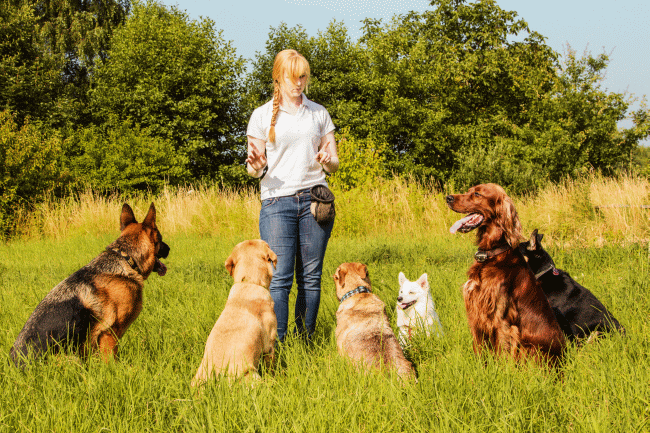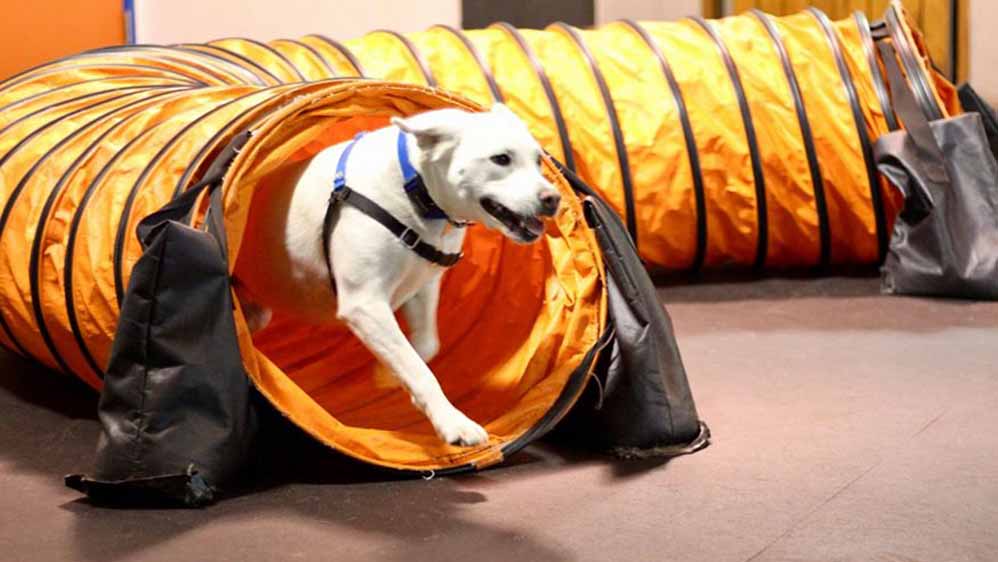Professional Dog Training Rochester NY for All Types of Behavioral Needs
Professional Dog Training Rochester NY for All Types of Behavioral Needs
Blog Article
Transform Your Canine's Habits With Proven Training Approaches
Transforming your pet's behavior calls for a nuanced understanding of their specific traits and needs, as well as the application of tried and tested training methods. By using favorable reinforcement and recognizing crucial add their body movement, you can efficiently resolve common behavior problems such as too much barking or jumping. Consistency in your training method not just boosts obedience but likewise cultivates a much deeper bond of count on and respect between you and your animal. However, the course to effective makeover might provide unanticipated difficulties that warrant more exploration.

Comprehending Pet Behavior
Recognizing pet actions is important for reliable training and interaction in between humans and their canine companions. Canines, as social pets, exhibit an array of actions influenced by genes, atmosphere, and experiences. Identifying these actions assists owners tailor their training approaches to fulfill the specific demands of their canines.
Secret facets of dog habits include body language, articulations, and social communications. Furthermore, socializing plays an important duty in forming actions; pet dogs that interact favorably with different people and other animals are typically much more adaptable and well-adjusted.
In addition, recognizing stress and anxiety signals-- such as pacing, panting, or avoidance habits-- can protect against acceleration right into more serious concerns. Proprietors that are in harmony with their canine's habits can create a nurturing and safe setting, promoting count on and boosting the training process. Ultimately, a deep understanding of canine behavior lays the foundation for an unified partnership and effective training outcomes, ensuring both pets and their owners grow together.
Favorable Support Techniques
Positive support techniques are extensively acknowledged as one of one of the most efficient techniques for training pets, cultivating a positive discovering atmosphere. This strategy entails gratifying preferred habits with deals with, praise, or play, thus encouraging the dog to duplicate those actions (Dog training). Unlike punitive techniques, favorable support builds count on and reinforces the bond between the canine and the instructor
Benefits should be offered instantly adhering to the wanted habits to aid the pet dog make the link. Consistency is also necessary; making use of the very same commands and rewards assists the pet recognize what is anticipated.
It is essential to note that positive support is not concerning bribery; rather, it is about enhancing great actions. In time, as the pet dog learns to associate certain activities with favorable end results, the regularity of incentives can be progressively lowered, transitioning to spoken appreciation or recurring benefits. This method not just encourages obedience yet additionally promotes a positive and delighted canine, making training a more pleasurable experience for both parties entailed.
Attending To Usual Problems
Resolving common concerns during pet training is important for ensuring a harmonious and successful relationship between the pet dog and its proprietor. Several dog proprietors come across behavioral difficulties, such as excessive barking, leaping, and chain drawing. Recognizing the origin of these behaviors is critical for efficient training.
To mitigate this, provide sufficient physical workout, psychological stimulation, and opportunities for social communication with both people and Learn More Here other pets. Educating the pet to sit upon welcoming can reroute this habits positively.
Chain pulling is one more widespread problem, often arising from a pet's passion to discover. Utilizing proper leash handling strategies, integrated with training protocols that motivate loose-leash walking, can significantly enhance this habits.
Furthermore, issues like resource safeguarding or splitting up stress and anxiety call for tailored strategies. Gradual desensitization and counter-conditioning can be reliable in attending to these obstacles. By recognizing and proactively taking care of these usual issues, pet dog proprietors can promote an extra satisfying training experience and reinforce the bond with their canine friends.
Uniformity in Training
Consistency is a foundation of efficient pet dog training, as it establishes a clear structure for the pet dog to understand actions and assumptions. When commands, incentives, and signs are applied consistently, pet dogs can a lot more conveniently comprehend what is called for of them. Irregular training can lead to confusion, leading to undesirable behaviors that frustrate both the pet and the trainer.
To accomplish consistency, it is important that all participants click this link of the household stick to the exact same training methods. Using the exact same spoken hints you could check here and hand signals makes certain that the dog receives consistent messages. Additionally, the timing of adjustments and rewards need to correspond; instant support increases the chance that the pet dog will certainly connect the habits with the result.
Additionally, establishing a regimen can even more enhance consistency. Routine practice, paired with organized timetables for feeding, strolling, and playtime, assistance pets prepare for and recognize their setting, making them much more receptive to training. Ultimately, consistency cultivates a complacency and count on, equipping pet dogs for more information effectively. By dedicating to a structured method, instructors can advertise favorable habits modifications and cultivate a well-mannered friend.
Building a Strong Bond
How can cultivating a solid bond between a canine and its owner enhance the training experience? When a pet dog really feels secure in its link with its owner, it is much more most likely to exhibit positive behaviors and be receptive to learning.

Additionally, a well-established connection can lower anxiousness and behavior concerns, as dogs are less most likely to act out when they really feel understood and cared for. Focusing on the development of a solid bond not just enhances the training experience but likewise adds to a better and more well-adjusted canine. Eventually, the trip of training changes right into a collective partnership, leading to lasting behavioral improvements.
Conclusion

Proprietors who are attuned to their canine's behavior can develop a caring and risk-free environment, fostering trust and boosting the training process. Ultimately, a deep understanding of canine behavior lays the structure for a harmonious connection and effective training end results, ensuring both dogs and their owners flourish together.
Addressing common problems during dog training is vital for making certain a successful and harmonious connection in between the canine and its proprietor (Dog training).Uniformity is a cornerstone of effective canine training, as it develops a clear structure for the pet dog to comprehend habits and assumptions.In conclusion, transforming a pet's behavior via proven training approaches calls for an understanding of canine behavior, the application of positive reinforcement methods, and an emphasis on uniformity
Report this page